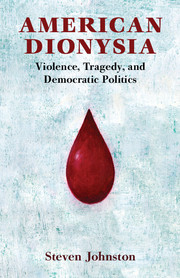Book contents
- Frontmatter
- Contents
- Acknowledgments
- Introduction: There Will Be Blood: Antinomies of Democracy
- 1 American Dionysia
- 2 Democracy at War with Itself: Citizens
- 3 Democracy at War with Itself: Animals
- 4 Forcing Democracy to Be Free: Rousseau to Springsteen
- 5 Two Cheers for Democratic Violence
- 6 New Tragic Democratic Traditions
- Conclusion: Democracy's Tragic Affirmations
- Notes
- Bibliography
- Index
2 - Democracy at War with Itself: Citizens
Published online by Cambridge University Press: 05 May 2015
- Frontmatter
- Contents
- Acknowledgments
- Introduction: There Will Be Blood: Antinomies of Democracy
- 1 American Dionysia
- 2 Democracy at War with Itself: Citizens
- 3 Democracy at War with Itself: Animals
- 4 Forcing Democracy to Be Free: Rousseau to Springsteen
- 5 Two Cheers for Democratic Violence
- 6 New Tragic Democratic Traditions
- Conclusion: Democracy's Tragic Affirmations
- Notes
- Bibliography
- Index
Summary
But the one thing I always begged for was never given: Safe passage home. No, I've been here for ten years now, wasting away, suffering starvation and misery, feeding my flesh to this insatiable sickness. This is what the sons of Atreus and Odysseus have inflicted on me. May the Gods on Olympus one day make them suffer for what they did.
Sophocles, PhiloctetesThe democratic citizen … is less willing than members of other societies to be a mere stone in an edifice.
William E. Connolly, Politics and AmbiguityIf democracy bends toward the tragic, patriotism leans toward the Gothic. As democracy's agent, patriotism draws on horrific events, construed in ghoulish terms, to service democracy's need for love, fealty, and tribute. Democracy seems content, even pleased, to allow patriotism free reign insofar as patriotism obscures the tragic dynamics that bedevil it, including practices best characterized as prejudicial, even suicidal, to democracy. Patriotic culture, of course, understands itself differently. As far as it's concerned, patriotism reminds citizens that democracy, a uniquely vulnerable kind of polity, faces lethal enemies and imminent threats, a judgment that many citizens have no desire to challenge, let alone reject. For circumstances often dictate that a democracy mimic its enemies to protect itself against them, to fully prepare for the danger sure to materialize. As democracy's servant, patriotism happily plays its supporting role, but it also frequently assumes center stage.
Though democracy is well-advised to explore a tragic political sensibility, it prefers a patriotic comportment instead. Patriotism, it must be remembered, likes to sound warnings (urgent, dire) and demand remedies (bold, dramatic) on behalf of the democracy it ostensibly serves. It's all quite exciting, romantic, and a bit melodramatic. But not unsurprising. Democracy apparently creates an unacknowledged need for patriotism and its bedazzlements. Nietzsche argued that killing God was a deed too great for its authors to abide. Likewise, democracy may find living in a world beset by its own tragedies too terrible to admit.
- Type
- Chapter
- Information
- American DionysiaViolence, Tragedy, and Democratic Politics, pp. 54 - 88Publisher: Cambridge University PressPrint publication year: 2015



